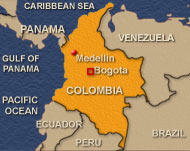S American trade hit by bird flu fears
In Latin America, some countries are taking draconian steps to stop bird flu before it even shows up.

In recent days, five countries banned poultry from Colombia. Then, Colombia banned rice from Bolivia and Ecuador.
Experts say it is wise for governments to prepare for a potential worldwide flu outbreak that could arise if the bird flu sweeping Asia mutates into a form that is easily spread among people.
But they say these import bans make no scientific sense. And the measures have unnecessarily raised cross-border political tensions and hurt commerce.
This strange episode began on 10 October, when Colombia took the unusual step of notifying world health authorities about a flock of chickens infected with a mild type of bird flu different from the virus in Asia. Chickens can get several varieties of bird flu, not all of them risky to people.
Tit-for-tat
Colombia’s action suffered an almost immediate backlash for being overly cautious and for raising the bird flu spectre unnecessarily.
Bolivia, Ecuador, Panama, Peru and Venezuela halted imports of Colombian poultry – even though Colombia insisted tests by the US Department of Agriculture under supervision of the Pan-American health officials proved the virus was not the H5N1 sweeping Asia or another highly pathogenic strain.
Colombia “didn’t even have to report this low pathogenic virus”, said Dr Richard Lee, a bird flu expert and professor at the State University of New York at Buffalo.
 |
|
Colombian poultry imports have |
But the reaction by Colombia’s neighbours, he said, was “definitely not justified”.
Yanzhong Huang, a bird flu specialist who heads the Centre for Global Health Studies at Seton Hall University in the United States, said the action by Colombia‘s neighbours might confuse the public if the poultry bans were long-term.
“It could reinforce the misperception that you could catch flu by eating fowl,” Huang said. Experts say no one has caught bird flu from eating properly cooked poultry.
Hitting back
Colombia struck back at some of its neighbours last week by halting imports of rice from Bolivia and Ecuador, though Colombian officials denied the move was retaliatory.
Colombia’s Agriculture Minister Andres Felipe Arias was quoted on El Tiempo newspaper’s website as saying that “migratory birds land in rice fields”.
But rice has never been identified as a “passive carrier” of bird flu, and any flu in rice would be killed in cooking, said Lee, the SUNY professor.
What are the chances of Colombians catching bird flu after handling or eating Bolivian or Ecuadorean rice?
“Pretty damned unlikely,”he said.
The amount of rice Ecuador and Bolivia export to Colombia is relatively small: Ecuador sent 18,500 metric tons worth $7 million from January through October; Bolivia makes only occasional shipments.
But experts are worried the mini-commerce battles involving bird flu could mushroom. Bolivian farmers are already worried the ban could be extended to their important soy industry, and Ecuadorean officials are seething over the ban.
Colombian officials “can’t close the border over something that doesn’t exist”, Ecuador’s agriculture minister, Pablo Rizzo, said in an interview.
Unnecessary bans
Latin America has even been on the receiving end of other countries’ harsh and unnecessary actions. The African nation of Senegal last week banned all poultry imports, including those from Brazil, the world’s largest chicken exporter.
 |
|
Colombia has in turn banned rice |
Brazilian producers called it an extreme reaction due to bird flu paranoia, but said they would not be surprised if more countries followed suit, putting a dent in this year’s estimated chicken exports of $3.5 billion.
Bird flu is not the only animal disease that causes bilateral problems. More than 45 countries imposed partial or total bans on Brazilian beef imports after a recent outbreak of foot-and-mouth disease in cattle near the country’s border with Paraguay.
Foot-and-mouth disease, which also strikes sheep, pigs and goats, is a highly contagious virus that can be spread through minimal contact with infected animals, farm equipment or meat. The disease can be fatal in animals, but does not harm humans.
A blame game between Brazil and Paraguay over the cause illustrates the need for less bickering between nations over animal diseases and increased regional monitoring to identify and contain the outbreaks, said Juan Lubroth, an animal health expert with the UN’s Food and Agriculture Organistion in Rome.
In the cattle case, Brazil pointed the finger at infected Paraguayan cows smuggled into Brazil by Brazilian ranchers.
Paraguay denied the cows had the disease, and accused Brazil of failing to promptly report the outbreak.